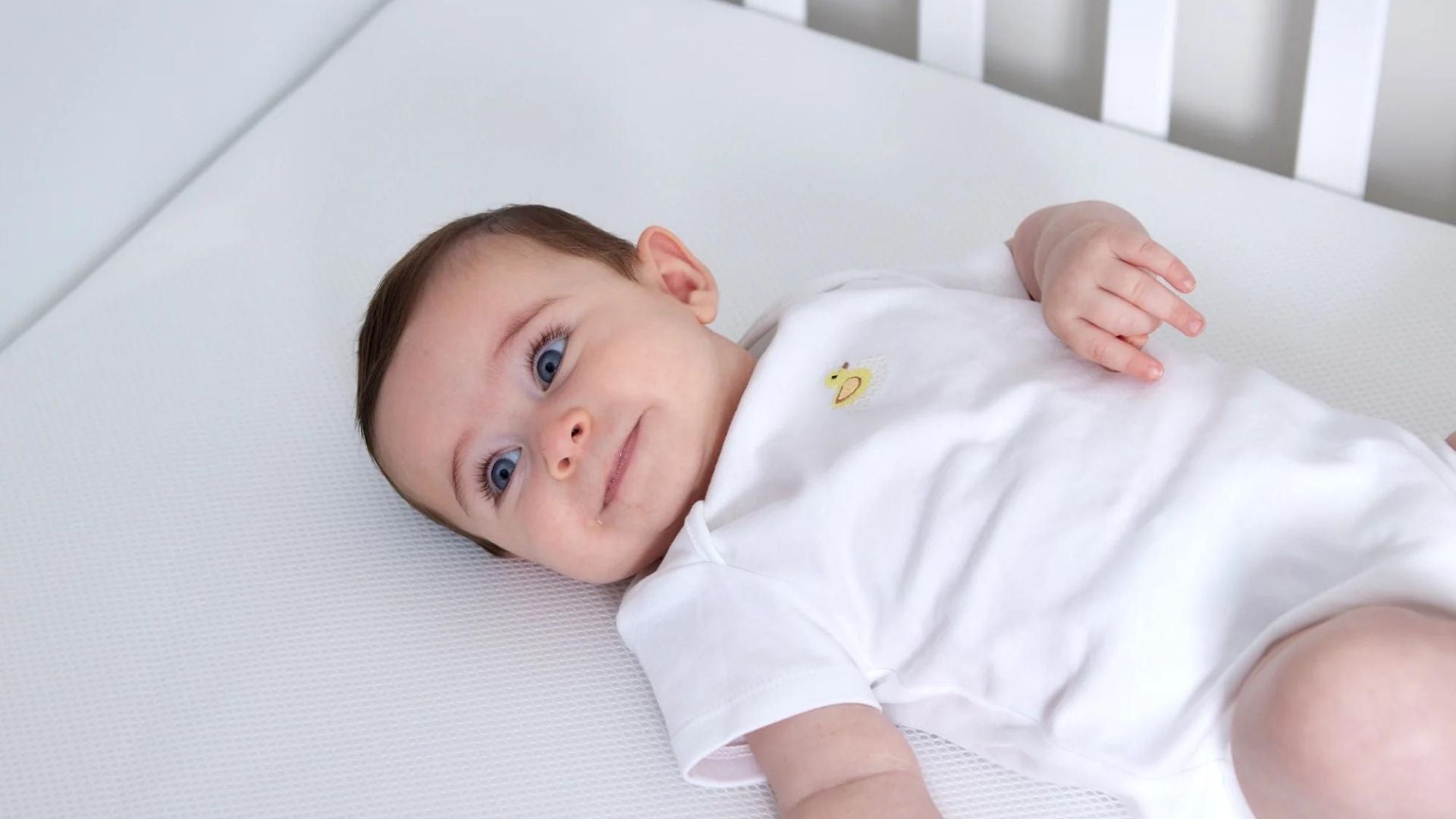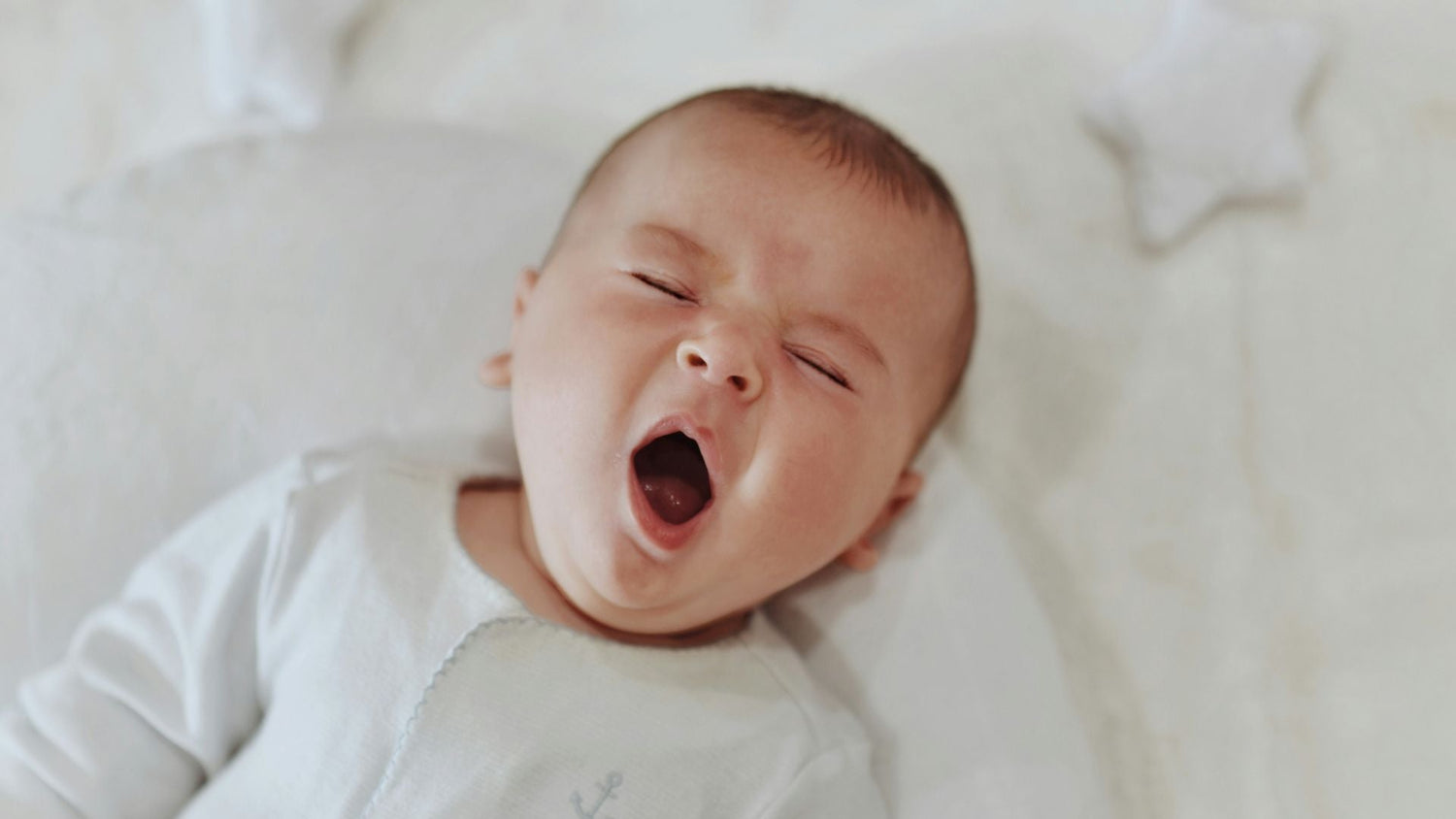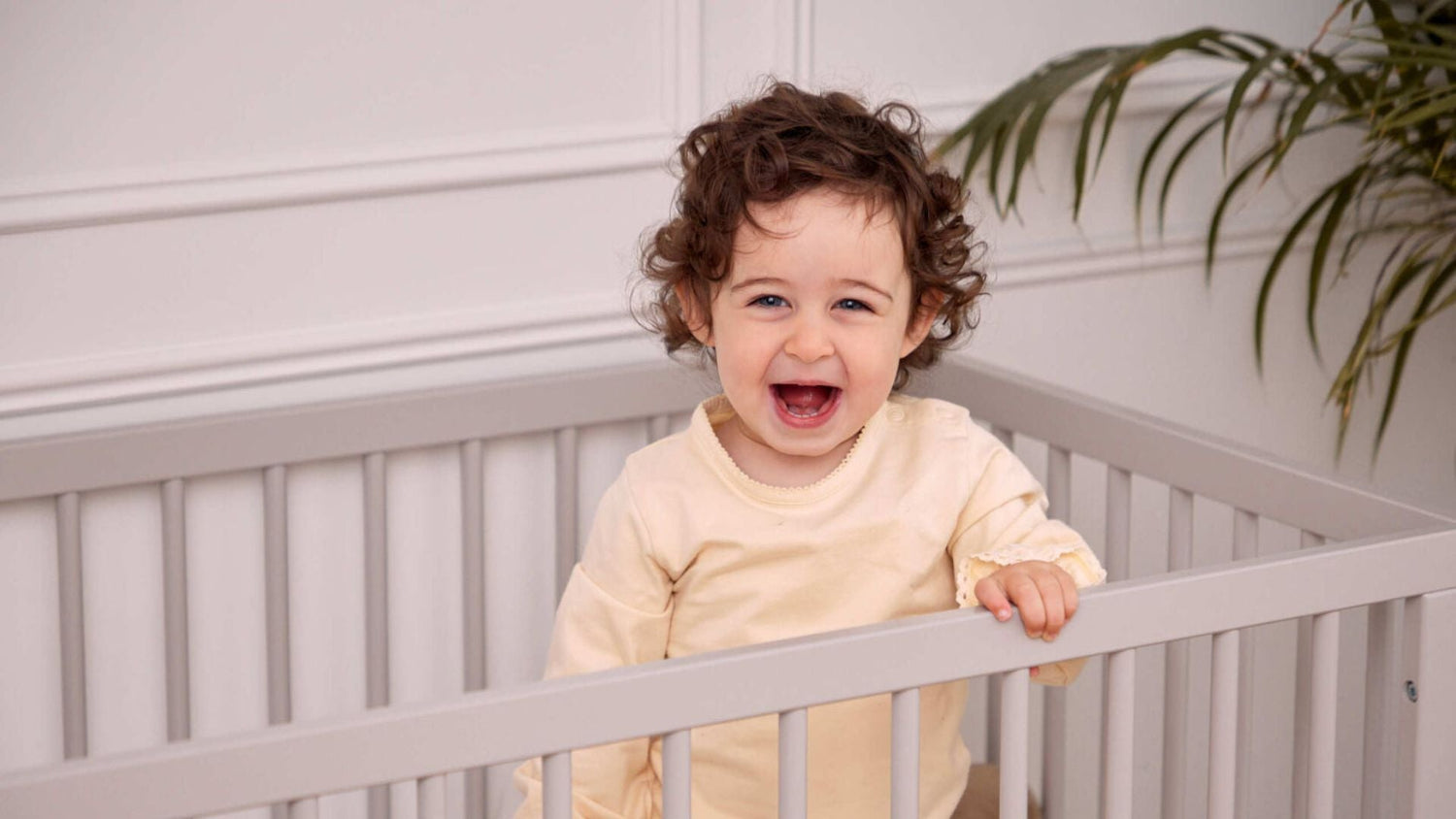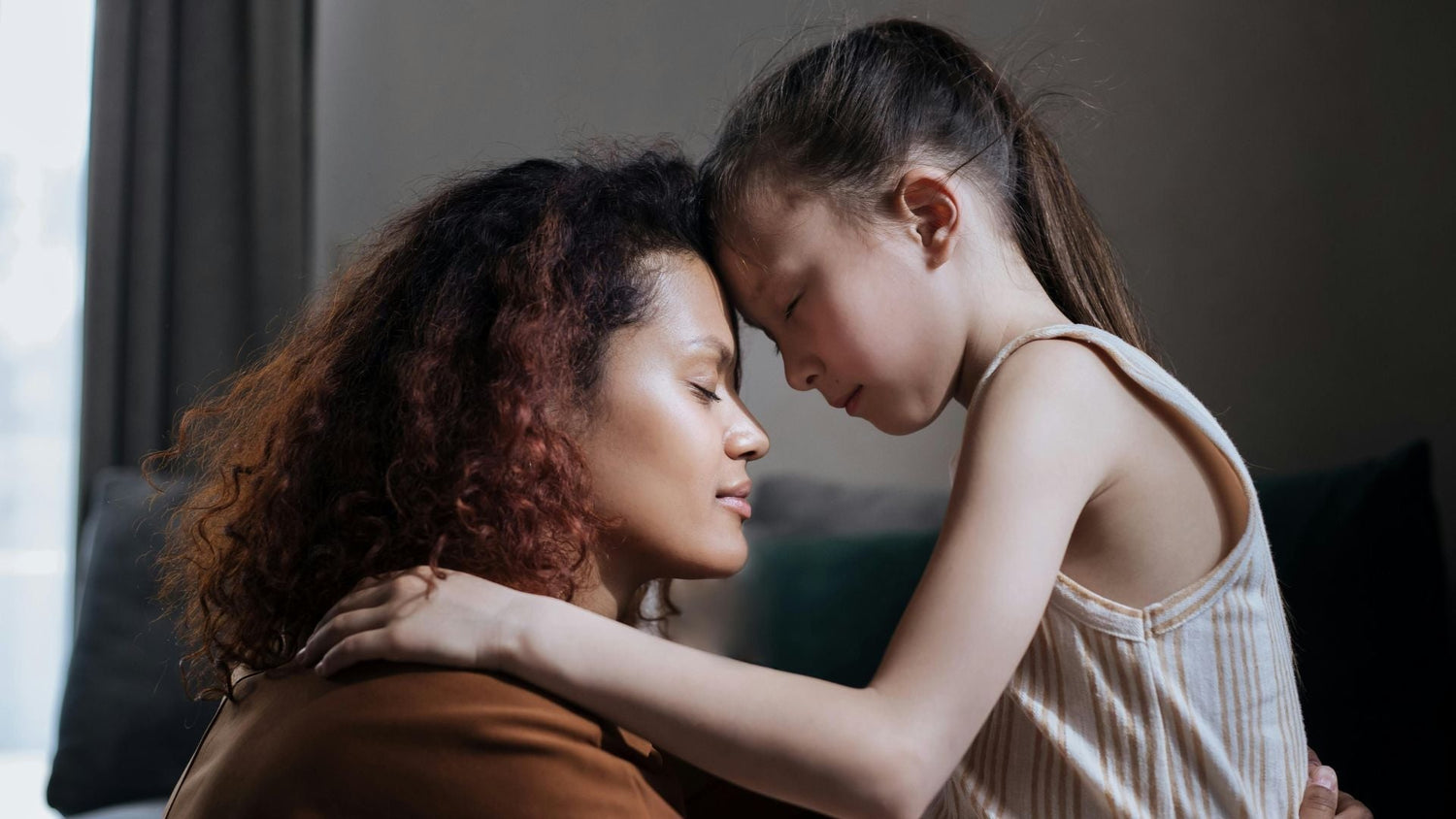Ensuring your baby has a safe and comfortable place to sleep is one of the most important tasks for any parent. In this complete guide, we will explore the best baby mattresses, how to choose the right one, how to keep it clean, and when to replace it. Let’s dive in!
Scroll through the blog or jump immediately to the section you need:
- What Mattress is Best for a Baby
- How to Choose a Baby Mattress
- How to Clean a Baby Mattress
- Why Are Baby Mattresses So Hard
What Mattress is Best for a Baby?
Choosing the best mattress for your baby can be overwhelming with so many options available. It’s important to consider several factors to ensure your baby sleeps safely and comfortably. Here’s what you need to consider:
-
Material: Look for mattresses made from breathable, hypoallergenic materials to ensure your baby sleeps comfortably and safely.
-
Firmness: A firm mattress is crucial for your baby's safety, reducing the risk of Sudden Infant Death Syndrome (SIDS).
-
Size: Ensure the mattress fits snugly in the cot, leaving no gaps that could pose a safety risk.
What Type of Mattress is Best for a Baby?
When selecting the type of mattress, consider the following:
-
Foam vs. Innerspring: Foam mattresses are lightweight and affordable, while innerspring mattresses offer more support and durability. For example, the Eco Fibre Mattress is a great foam option that provides excellent comfort and breathability.
-
Organic Options: If you prefer a more natural option, organic mattresses made from materials like cotton and wool are available.
Choosing between foam and innerspring depends on your preferences and budget. Foam mattresses are easy to handle and often more budget-friendly. Innerspring mattresses, on the other hand, provide excellent support and can last longer with proper care.
What Kind of Mattress is Best for a Baby?
The kind of mattress you choose should be firm, supportive, and covered with a waterproof layer to protect against spills and accidents. This not only ensures a comfortable sleeping environment but also makes cleaning easier. For example, this Micro Mattress offers firm support and comes with a removable, washable cover for easy cleaning. A good mattress will support your baby’s growing body and help them sleep soundly.
What Mattress is Best for a Baby Cot?
For a baby cot, it’s essential to choose a mattress that fits perfectly without any gaps. A standard cot mattress size is typically 120 x 60 cm or 140 x 70 cm. Ensuring a proper fit prevents any potential hazards where your baby could get trapped between the mattress and the cot. Additionally, the mattress should be firm and supportive to provide a safe sleeping environment. Always measure your cot before purchasing to ensure the mattress you choose fits snugly. The Baby Elegance Breath-Dry Mattress is designed to fit snugly and features advanced breathability for your baby's comfort.
How to Choose a Baby Mattress?
Choosing the right mattress for your baby is crucial for their comfort and safety. With so many options available, it can be challenging to know where to start. In this section, we’ll guide you through the key factors to consider, ensuring you make an informed decision that supports your baby's health and well-being.
Here are key tips on what to look for in a baby mattress:
-
Firmness: Opt for a firm mattress to support your baby's growing bones.
-
Breathability: Choose a mattress that allows air to flow freely to keep your baby cool and comfortable.
-
Ease of Cleaning: A mattress with a removable and washable cover is a practical choice.
How Thick Should a Baby Mattress Be?
A baby mattress should be between 8 to 12 cm thick. This thickness provides the right balance of comfort and support. Ensuring the mattress is neither too thin nor too thick helps maintain a safe sleeping environment for your baby.
How Firm Should a Baby Mattress Be?
The mattress should be firm enough to not conform to the shape of your baby's head. This helps in maintaining a safe sleeping environment by preventing suffocation risks. A firm mattress supports your baby's growing spine and promotes healthy development.
What Size is a Baby Mattress?
Standard baby mattresses are usually 120 x 60 cm or 140 x 70 cm. Always measure your cot to ensure a snug fit. A well-fitted mattress prevents gaps that could pose a safety hazard to your baby.
Do You Need a Mattress Protector? How Many Mattress Protectors per Baby?
Yes, a mattress protector is essential. It helps in keeping the mattress clean and prolongs its life by providing a barrier against spills and accidents. Having 2-3 protectors is advisable, so you have a spare when one is in the wash, ensuring continuous protection. If you’re just starting out with a newborn, consider this crib-sized Waterproof Mattress Protector. It is also available in cot, cot bed, and moses sizes.
How Much is a Baby Mattress?
Baby mattresses can range from £50 to £200, depending on the material, brand, and features. Investing in a quality mattress is important for your baby’s comfort and safety. For a budget-friendly yet high-quality option, consider the Baby Elegance Eco Fibre Mattress which offers excellent value for money.
What Baby Mattress to Buy?
Choose a mattress that fits your baby’s needs, ensuring it meets all safety standards and provides the comfort and support they need. Look for mattresses with breathable materials and a firm surface. Reading reviews and consulting with other parents can also help you make an informed choice.
If your baby is premature or otherwise particularly sensitive to infection, consider this Health Care Fibre Mattress, which has been created using the newest Wellcare Protect fibre technology. The all-natural process of dehydrating the fibres ensures the mattress is biocide-free, making this the safest possible choice for your baby.
Where to Buy a Baby Mattress?
You can purchase baby mattresses from various retailers, including baby stores, online marketplaces, and department stores. For a wide selection of trusted mattresses from crib to cot bed, check out the complete Baby Elegance mattress collection here. We offer a variety of sizes and styles to meet your needs.
How to Clean a Baby Mattress?
Keeping your baby’s mattress clean is vital for their health and hygiene. Regular maintenance can prevent the buildup of allergens and bacteria, ensuring a safe sleeping environment. Here’s how to tackle different types of messes:
-
Vacuum Regularly: Use a vacuum cleaner to remove dust and allergens.
-
Spot Clean: For small spills, use a damp cloth with mild soap.
-
Deep Clean: Every few months, deep clean with a mixture of water and baby-safe disinfectant.
How to Clean Baby Mattress Pee?
Addressing urine stains promptly helps maintain the mattress's cleanliness and longevity. Vinegar is an effective natural cleaner that neutralises odours. Make sure the mattress is fully dry before use to avoid mould and mildew.
-
Blot Immediately: Use a dry towel to absorb as much urine as possible.
-
Clean the Area: Apply a mixture of water and vinegar to neutralise the smell.
-
Dry Thoroughly: Ensure the mattress is completely dry to prevent mould growth.
How to Clean Baby Mattress Vomit?
Cleaning vomit from a mattress involves several steps to ensure thorough sanitation. Start by removing solids to prevent further staining. Using baking soda helps to eliminate any unpleasant smells and keeps the mattress fresh.
-
Remove Solids: Carefully remove any solid particles.
-
Clean the Stain: Use a mixture of mild detergent and water to clean the stained area.
-
Deodorize: Sprinkle baking soda over the area to absorb any lingering odours, then vacuum it up.
How to Clean Baby Poop from Mattress?
Cleaning baby poop from a mattress promptly ensures it remains hygienic and fresh. Start by gently scraping off any solid waste with a plastic spatula or similar tool. Then, use a cloth dipped in soapy water to thoroughly clean the affected area, ensuring all residue is removed. Follow this by applying a baby-safe disinfectant to eliminate any lingering bacteria. Finally, make sure the mattress is fully dry before placing it back in the cot to prevent mould and mildew growth.
-
Remove Solids: Gently scrape off any solid waste.
-
Clean Thoroughly: Use a cloth dipped in soapy water to clean the area, followed by a disinfectant safe for babies.
-
Dry Completely: Ensure the mattress is fully dry before putting it back in the cot.
Why Are Baby Mattresses So Hard?
Baby mattresses are firm to support proper spinal alignment and reduce the risk of SIDS. The firmness helps in maintaining a safe sleeping environment, preventing suffocation risks. Soft mattresses can create dangerous indentations that may trap a baby’s face, making it difficult for them to breathe and increasing the risk of accidents.
When Can a Baby Sleep on a Soft Mattress?
Generally, babies can transition to a slightly softer mattress when they move to a toddler bed, around 18 months to 2 years old. This transition should be gradual to ensure the baby remains comfortable and safe. However, always follow the manufacturer's guidelines and recommendations to avoid any potential risks.
How to Incline a Baby Mattress?
For babies with congestion or reflux, you might consider inclining the mattress. Ensure the incline is gentle, no more than 10-15 degrees, to avoid creating an unsafe sleeping position. Always use a safe method to achieve this, such as a crib wedge, to maintain stability and safety.
How Long Do Baby Mattresses Last?
A good quality baby mattress can last up to five years, depending on its use and care. Regular maintenance and proper cleaning can extend its lifespan. However, it’s essential to replace it if it shows signs of wear or damage to ensure your baby’s safety and comfort.
When to Change a Baby Mattress?
Replace the mattress when it becomes worn out, loses its shape, or has been used by multiple children. Over time, mattresses can lose their firmness and support, making them less safe. Regularly inspect the mattress for any signs of wear and replace it as needed to maintain a safe sleeping environment.
Why Buy a New Mattress for Each Baby?
A new mattress is recommended for each baby to ensure maximum hygiene and safety. Over time, mattresses can accumulate bacteria, allergens, and lose their supportive properties, making them less safe and comfortable. Investing in a new mattress for each baby helps prevent potential health risks and ensures optimal support for your baby’s development.
If you think your baby’s mattress is ready to be replaced, consider the Baby Elegance Micro Mattress. As our top selling baby mattress, it is a tried and true crowd pleaser. This mattress is thoughtfully crafted with an anti-allergy fibre core and a bevelled micro fibre cover that creates a cosy air pocket, ensuring a peaceful night's sleep for your growing baby.









